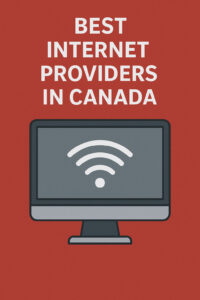Unlimited internet is no longer a luxury in Canada, it’s the baseline. Families stream Netflix in 4K, gamers need low latency, and remote workers count on rock-solid connections for Zoom calls and cloud uploads. The tricky part is not finding unlimited plans, but figuring out which provider gives you the right balance of speed, reliability, and value. This guide breaks down how unlimited internet really works, explains the different connection types, shows what speeds fit different households, and profiles both big and independent providers. You will also find practical advice for avoiding hidden fees, choosing the right hardware, and getting the best deal without paying for more than you need.
How Unlimited Internet Works in Canada
When a provider advertises “unlimited,” it means your usage is not capped, so no surprise overage fees. But unlimited does not mean the fastest possible speeds at all times. Your experience depends on the connection type, your home wiring, the quality of your router, and even neighborhood congestion.
- Fiber: Consistent, symmetric speeds with very low latency, best for video calls and creators.
- Cable: High downloads, but typically slower uploads than fiber. Widely available across cities.
- Fixed Wireless: Crucial in rural areas. Speeds depend on signal quality and distance from the tower.
- DSL/Copper: Still present in some regions, but limited to modest speeds.
- Specialized Building Fiber: Boutique providers serving condos or certain neighborhoods with ultra-fast, symmetric internet.
Choosing the Right Speed
How much speed you need depends on your household:
- Singles or couples working from home: 100–300 Mbps is usually enough, as long as uploads are decent.
- Families of 3–4 with 4K TVs, gaming, and cloud backups: 500 Mbps to 1 Gbps keeps everyone happy.
- Power users and creators: Multi-gig (1.5–3 Gbps) plans offer headroom, but only if your home network supports it.
Tip: Upload speeds and latency often matter more than raw download peaks. Prioritize those if you’re on video calls, gaming, or working in the cloud.
Canada’s Best Unlimited Internet Providers: Quick Overview
| Provider Type | Technology | Typical Unlimited Speeds | Best For |
|---|---|---|---|
| Big National Providers | Fiber & Cable | 150 Mbps – 3 Gbps | Large families, hybrid workers, 4K streaming |
| Independents | Resold Cable or Fiber | 75 Mbps – 1 Gbps | Value-focused households who want lower costs |
| Rural / Fixed Wireless | Wireless Towers, 5G FWA | 50 – 300 Mbps | Rural homes that need unlimited usage |
| Specialized Fiber | Pure Fibre (Condos/Neighborhoods) | 300 Mbps – 3 Gbps symmetric | Condos, MDUs, creative professionals |
Providers Worth Highlighting
Diallog Internet
If you work from home, run a small studio, or need reliable upload speeds, Diallog is an excellent choice. Unlike mass-market providers, Diallog offers business-grade reliability with consumer-friendly pricing. They even provide optional static IPs, making them ideal for freelancers, content creators, and prosumers who need a bit more than the average household plan.
- Speeds: Up to 1 Gbps
- Plans: Month-to-month flexibility
- Why choose them: Strong upload speeds and premium support
CanNet Internet
For pure affordability, CanNet consistently undercuts the competition. Their unlimited cable plans are priced to fit students, budget-minded families, or anyone who just wants a straightforward connection without paying for extra frills. Be mindful of price increases after promo periods, but if keeping costs low is your top priority, CanNet is hard to beat.
- Speeds: 150 Mbps – 1 Gbps
- Plans: Low introductory rates, typically 1-year terms
- Why choose them: Some of the cheapest unlimited internet in Canada
Virgin Plus Internet
Backed by Bell’s powerful network, Virgin Plus Internet delivers a great balance of speed, flexibility, and value. Unlike Bell, Virgin Plus often has more attractive promos and truly flexible month-to-month plans. If you are already a Virgin Plus mobile customer, bundling can save you even more.
- Speeds: Up to 1 Gbps
- Plans: Month-to-month, no long-term lock-in
- Why choose them: Bundle perks and competitive pricing on Bell’s backbone
How to Compare Plans Like a Pro
- Check both intro and regular prices: Calculate your 24-month cost to avoid surprises.
- Look at equipment fees: Modem rentals or Wi-Fi add-ons can add $10–$20/month.
- Prioritize upload & latency: Especially if you game, stream, or video call daily.
- Confirm “unlimited” really means unlimited: Some providers manage traffic during peak hours, ask about policies.
- Stay flexible: If possible, choose month-to-month so you can switch when a better deal pops up.
Bottom Line
Unlimited home internet is everywhere in Canada, you just need to match the right provider to your needs. If you want business-grade reliability, Diallog is worth a look. If your budget rules the decision, CanNet delivers some of the lowest unlimited prices nationwide. And if you love flexible bundles, Virgin Plus Internet balances speed and savings. Compare your options, check your postal code, and choose the plan that keeps you connected without breaking the bank.






